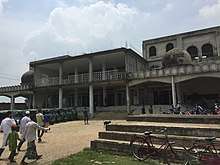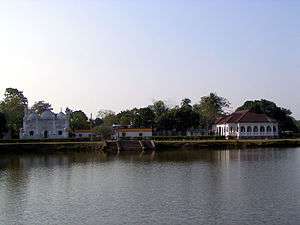Prithimpassa Union
Prithimpassa Union (Bengali: পৃথিমপাশা ইউনিয়ন) is a Union Parishad under Moulvibazar Sadar Upazila of Moulvibazar District in the division of Sylhet, Bangladesh. It has an area of 21 square kilometres and a population of 18,053.
Prithimpassa Union পৃথিমপাশা ইউনিয়ন | |
|---|---|
Union Council | |
| No. 12 Prithimpassa Union Council | |
| Country | Bangladesh |
| Division | Sylhet Division |
| District | Moulvibazar District |
| Upazila | Kulaura Upazila |
| Government | |
| • Union Parishad Chairman | Ali Bakr Khan Hasnayn |
| Population | |
| • Total | 31,341 |
| Demonym(s) | Prithimpassi |
| Time zone | UTC+6 (BST) |
| Website | prithimpassaup |
History

The union was named after the village of Prithimpassa, home of the Prithimpassa Nawab family.[1] In 1499, a Persian nobleman from Isfahan known as Prince Sakhi Salamat settled in Prithimpassa, Kulaura. Being a wealthy nobleman; his son, Ismail Khan Lodhi, was granted a jagir by the Mughals and given the status of Nawab in addition to other prestigious titles.
In 1756, the Nawab of Longla Moulvi Muhammad Rabi Khan Danishmand established the famous Rabir Bazar (Rabi's Market). Begum Talib-un-Nisa Khatun of Chhoto Saheb Bari (Prithimpasha village) established the Rabir Bazar Jame Masjid.[2]
In the anti-British Sepoy Mutiny of 1857, 300 sepoys who revolted against the British, looted the Chittagong Treasury and took shelter with Nawab Gaus Ali Khan of Prithimpassa. The treasury remained under rebel control for several days.[3] Abdul Ghafur, grandfather of Ali Haydar ibn Ali Gawhar, of Kanihati was present during the mutiny.[4]
In 1950, the Shah of Iran, Mohammad Reza Pahlavi, visited Prithimpassa and stayed for four days at the palace and went wildlife hunting in the Estate forests alongside Khwaja Nazimuddin and Ayub Khan.
Demography

Prithimpassa has a population of 18,053.
Administration
Prithimpassa constitutes the no. 11 union council of Moulvibazar Sadar Upazila. It contains villages and mouzas.[1]
Economy and tourism
Prithimpassa has a significant number of British and American immigrants contributing to its economy. It has three state-owned bazaars; Robir Bazar, Chhoidol Bazar and Brindaranir Dighir Par Bazar, and it also has four non-governmental bazaars; Rajnagar Chaumuhani Bazar, Nandigram Bazar, Pursai Bazar and Jhilerpar Bazar. The Prithimpassa family estate is a historical site which attracts tourism in the Union.
Language and culture
The native population converse in their native Sylheti dialect but can also converse in Standard Bengali. Languages such as Arabic and English are also taught in schools. The Union contains 14 eidgahs; Shikoriya, Gonokiya, Dhamuli, East Gajbhag, Karaigram, Alinagar, Shomman Shahi, Kanaitikor, Yusuf Sadar, Rajnagar, Rabir Bazar, Sultanpur Shahi, Bhatgaon and Pursai Eidgah.[5] There are many mosques, most notable the historic Rabir Bazar Jame Masjid.
List of chairmen
| Number | Name | Term | Note |
|---|---|---|---|
| 01 | Ali Yeawar Khan | ||
| 02 | Ali Safdar Khan | ||
| 03 | Muhammad Mahbubur Rahman Chowdhury Notu Miah | ||
| 04 | Muhammad Abdul Wahid | 1973-1987 | Alauddin Ahmad served as Vice-chairman |
| 05 | Muhammad Abdul Ghafur | 28/2/1988 - 22/8/1989 | |
| 06 | Muhammad Ishaq Ali | 23/8/1989 - 31/3/1992 | |
| 07 | Ali Naqi Khan | 1/4/1992 - 4/2/1998 | |
| 08 | Muhammad Abdul Latif | 5/2/1998 - 3/3/2003 | |
| 09 | Ali Naqi Khan | 4/3/2003 - 1/8/2011 | |
| 10 | Muhammad Abdul Latif | 2/8/2011 - 1/8/2016 | |
| 11 | Ali Bakr Khan Hasnayn | 2/8/2016 - present |
References
- "পৃথিমপাশা ইউনিয়ন". Retrieved 3 April 2020.
- Chowdhury, Muhammad Shakil Rashid (29 May 2016). "রবিরবাজার জামে মসজিদ". Samakal.
- "Rare 1857 reports on Bengal uprisings". Times of India.
- Sreehatter Itibritta – Uttorangsho (A History of Sylhet), page 263-264, Achyut Charan Choudhury; Publisher: Mustafa Selim; Source publication, 2004
- "Eidgah".